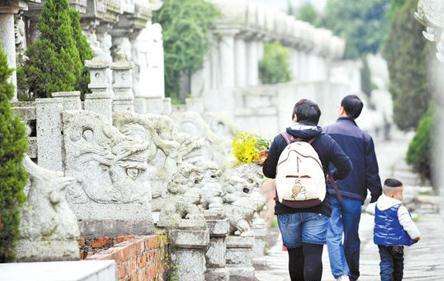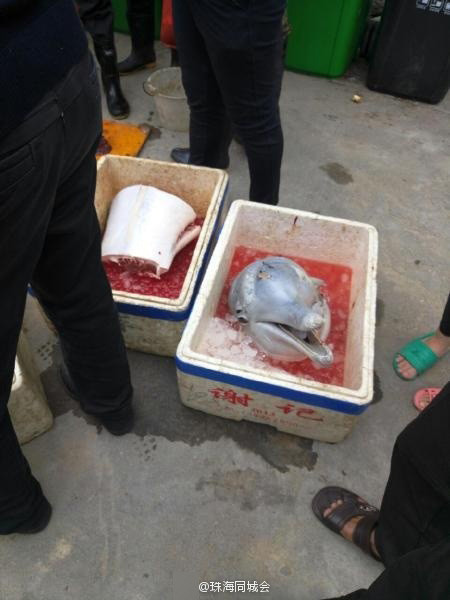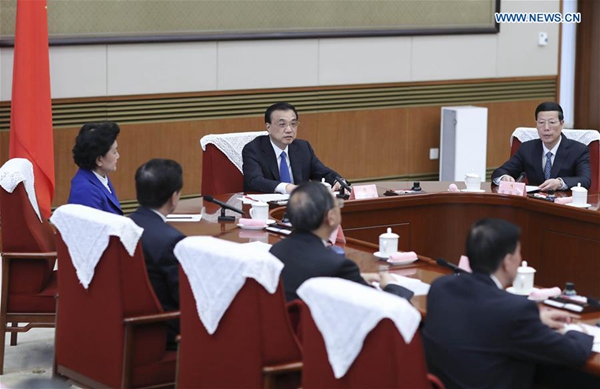Cyberspace haunts ancient tomb rituals
|
|
|
Tomb sweeping in Qinghua Festival [File Photo] |
QR codes are part of daily life for most people. Short for “quick response” code, they are machine-readable labels that allow us to add new WeChat friends, pay bills with smartphones and order food in restaurants, among a myriad of other easy functions.
They have become so ubiquitous that some people joke QR codes will one day replace tombstones, allowing people to scan a code by mobile phone and access the names and achievements of ancestors that used to be engraved in granite.
Actually, it’s no longer a laughing matter.
The annual Qingming Festival, or traditional tomb-sweeping day, falls on Tuesday this year, and QR codes are appearing in graveyards across China.
The matrix bar codes come in various forms, such as stickers, bronze plates or plastic tags. They cost up to 3,000 yuan (US$436). Scanning a code leads to a memorial page honoring the dead.
Many graveyard companies operate online memorial pages, where one can also give virtual flowers, burn virtual candles and buy virtual gifts for the dead, either for free or for a few cents. So far, the new trend hasn’t really caught on much.
Some companies are also offering live streaming services for those who cannot get to cemeteries for Qingming this year. Staff clean the tombstones, bow to them and place flowers on graves for absent clients who can watch the ritual via live streaming video on mobile phone apps.
Needless to say, all this digital intrusion into what is an old and revered festival in China is stirring up a bit of controversy. Some Chinese netizens say that the new practices are fitting substitutes for those who cannot make it to graveyards and that they promote a cleaner environment because less traditional paper money is burned at tombs. Others say online tomb-sweeping services are crass and lack respect.
“The QR code service really ties in well with a more ecological approach to funerals because it is much smaller than the typical tombstone,” the Zhejiang Province Funeral Association said at a recent press conference, recommending the service.
The association staff said they are actively promoting alternative funeral services, like burying the ashes of loved ones under trees or in flower beds, or throwing them onto waterways or into a brisk wind.
Government subsidies of around 1,500 yuan are given to those who chose not to buy a plot of land to bury their dead. Land is becoming scarce.
All the newly fangled ideas don’t sit well with traditional views about how the dead should be treated. Many people are afraid that alternative funeral services will mark them as disrespectful toward elders who have always been afforded a peaceful plot for their souls to rest in peace.
Many also worry that the absence of a large tombstone will rob them of a focal point for paying their respects and burning paper money to honor ancestors.
“The bronze QR code tag is small enough to fit in a flower bed, so people will know where their relatives are buried,” the funeral association staff explained. “We hope it will help some people consider alternative funeral options.”
China has traditionally been an agricultural economy, where the land long played a significant role in the lives and deaths of people. For many Chinese, the first thing to do after making some money is to return to their hometowns and build new houses.
Most still believe that the soul needs a piece of land to rest for eternity and for the others to visit and pay tribute.
“We Chinese always say, ‘You find peace after you are buried under the soil’,” says Peter Kuang, a 36-year-old software engineer who has been doing tomb-sweeping services every April for the past 10 years.
“I am not superstitious enough to believe that there is an afterlife or that the soul really needs a plot of land, but I don’t think it’s necessary to challenge old traditions that others in my family still believe in.”
He adds, “A piece of land and a tombstone are still considered necessities. Being there in person is also crucial. You go there, you burn your paper money, you kneel down and you say your prayers — not because ancestors really hear you but because you are showing them respect.
“We have lost so many traditions,” Kuang concludes. “The tomb-sweeping ceremony is almost the last sacred rite left. It feels ridiculous to just click a button and count that as respect paid.”
Indeed, modern development and the digital revolution have led many people to rue the passing of old traditions in Chinese holidays, especially Spring Festival and the Mid-Autumn Festival.
Nowadays, many people think of the Mid-Autumn Festival only in terms of eating mooncakes and of Spring Festival as just a weeklong break to go on a holiday.
Qingming Festival valiantly clings to old traditions, like burning fake money and other paper gifts for the dead. But with pollution becoming a hot-button issue, some cities have banned such gift-burning at graveyards and are urging residents to forsake their cars to avoid huge traffic jams.
In Shanghai alone, it is estimated that more than 8 million people will travel to suburban graveyards over the three-day Qingming holiday.
“It has become almost as bad as Spring Festival,” says Zhang Yuan, a 27-year-old migrant from Anhui Province, who works in Shanghai. “It’s harder to get back home when there are only three days for Qingming. I would prefer not to go, but my parents worry that we will be criticized by other relatives if I don’t show up.”
When he suggested that he might participate in tomb-sweeping via digital technology, his parents were outraged.
“They were furious,” he says. “They would have killed me via mobile phone if that were possible.”


